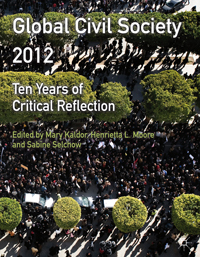

The Internet is of increasing relevance in people’s life in general, and in politics in particular. As a result, it is a favoured topic for political analysts and commentators who offer theories as to the role of the Internet in and for contemporary politics. With each new civil society upheaval, the debate reignites asking whether the uses of social media, such as Facebook and Twitter, are significant enough to merit the relabelling of these upheavals as ‘Facebook-’ or ‘Twitter-revolutions’.
More generally, there is an ongoing debate about if and how the Internet could be a solution for a number of democracy-related problems that analysts detect within the contemporary global context. Many of the commentaries and analyses offer rich and varied discussion of the relevance of the Internet for political analysis. And yet, contemporary political accounts of the role and significance of the Internet are somewhat ‘tame’ or even ‘tamed’.
This chapter takes a critical look at mainstream approaches to the Internet and suggests an alternative understanding of it to trigger a rethinking and a re-configuration of the conceptual frame that has guided political analyses hitherto.
First, instead of conceptualising the Internet as a virtual space and / or toolfor activism, or indeed as a ‘new type of territory’, as some analysts do, the paper follows theorists of digital culture and suggests that the Internet must be understood as a ‘set of interactions in process’. This involves envisaging the Internet as a set of resources, engagements, relations and structures through which the world is constantly renewed – rather than as a material object or single entity. Secondly, instead of thinking of the Internet as a thing separate from the ‘real’ world, that is, instead of working with the notion of a ‘great divide’ between the offline and the online (real/virtual, material/symbolic), the paper suggests that scholars acknowledge that the Internet today is fundamentally intertwined with socio-political structures and ‘offline’ lived realities.
The presented reconfiguration of the conceptual frame through which to study the Internet holds implications for political analysts’ scholarly imagination. Once we decide that the distinction between the ‘offline’ and the ‘online’ does not readily reflect contemporary lived reality, the Internet occupies a different position in our thinking about politics. Rather than asking how or if the Internet has the potential of changing or improving the ‘real’ world, we need to consider it as a part of a (political) world brought into being through complex sets of interactions between the offline and the online. Furthermore, Understanding the Internet as a set of interactions in process throws into question the value of the conceptual metaphors of ‘tool’ and ‘space’, because questions about what is happening ‘on’ the Internet, and how the internet is used, by whom, and with what impact on the ‘actual’ world no longer have sufficient analytical purchase. The internet is not a tool or a space for politics, but a set of interactions in process that constitute the political, and indeed the social and the economic. As such it is not a tool or a space to enable life, but life itself. And as Henrietta Moore argues in Still Life, this requires political and social analysts to focus as much on the concepts of creativity and imagination as they do on those of structure, space and intersection. We need a politics of the internet, and indeed a politics that starts from somewhere else.
Purchase this book